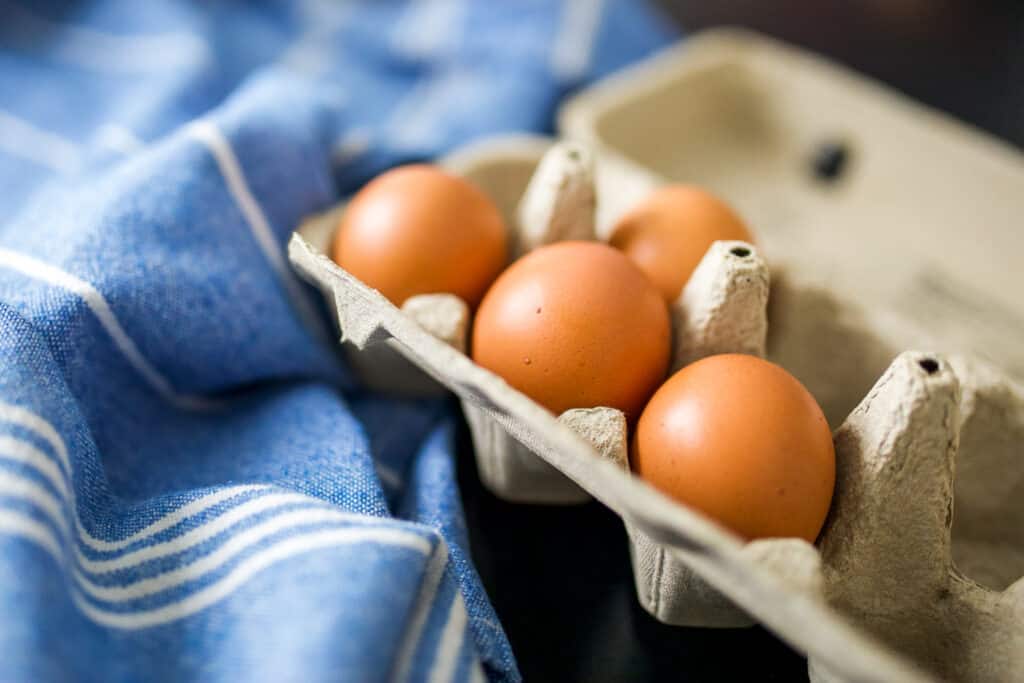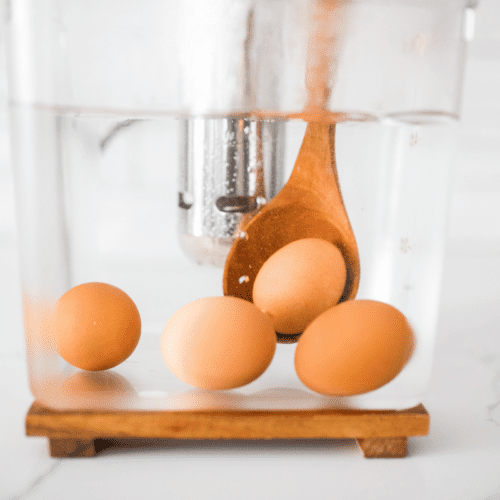If you’ve been on the fence about trying recipes that call for raw eggs, I’ve got some good news for you. You can easily pasteurize eggs sous vide at home. Then nothing will come in the way of you trying all the delicious cocktails, pasta, sauces, and desserts that call for raw eggs. Salmonella worry free enjoyment!
Pasteurization can seem like a very complicated and scary process. But in reality, it’s a simple recipe that needs to be followed to the T. And there’s no easier way to pasteurize eggs than sous vide. It’s pretty foolproof.
In this article, I’ll walk you through a step-by-step guide on how to pasteurize eggs with sous vide in the comfort of your kitchen. Follow along!

Table of Contents
Why Pasteurized Eggs Sous Vide Works
Pasteurization reduces the risk of food-borne illnesses, making it a safer option to consume for you and your loved ones. Knowing this gives you a sense of safety.
There are a lot of other reasons why you should try pasteurizing eggs in a sous vide at home:
- Extended shelf-life. Pasteurization kills harmful bacteria that can result in spoilage. This gives pasteurized eggs a longer shelf life than raw eggs.
- Convenient and fresh. Sous vide pasteurization is a very hands-off method. Moreover, it makes for eggs that will always be safer to eat than just store-bought ones.
- Budget-friendly. Pasteurized eggs sold in the market can be very pricey. Whereas pasteurizing eggs in sous vide at home can cost next to nothing.
Ingredient Notes
Raw eggs and water are the only things you need for the pasteurizing process. I couldn’t add any other ingredient to this list even if I tried. No weird-sounding ingredients, chemicals, or anything at all.

The Best Equipment for Making
You’ll need three things to pasteurize eggs at home:
- Sous vide cooker. Of course, you’ll need a sous vide cooker for this. Here is our in-depth post on the best affordable sous vide machines to pick from.
- Large bowl. Make sure the bowl is deep enough to check whether the eggs are sinking or not. You can also use a large jar for this purpose.
- Large pot or sous vide container. You’ll also need a large stock pot, or sous vide vessel to make the water bath. Make sure it is big enough to accommodate the eggs in a single layer.
Easy Instructions
- Get set up. Preheat the sous vide water bath to 135°F.
- Prep the eggs. Wash the eggs with cold water.
- Check the eggs. Fill a large bowl with water. Place the eggs in the water one by one to make sure they sink instead of float. Discard the ones that float.
- Pasteurize them. Add the eggs to the water bath and let them sit for 75 minutes. Then transfer to an ice water bath for 15 minutes.
- Store them. Dry the eggs using a kitchen towel and refrigerate them.

Uses
Quite a few dishes or recipes call for raw eggs.
These recipes usually use raw eggs as a binder, an emulsifier, or to add richness and smoothness to the dish. The flipside is that using raw eggs can increase the risk of foodborne illnesses.
This is where pasteurization comes in handy:
Beverages
Eggs are added to the cocktail to change its flavor, texture, or both. Egg whites add a nice creamy froth to the surface of drinks like a whisky sour, pisco sour, and Chicago fizz. On the other hand, egg yolks add a nice eggy flavor to eggnog.
Desserts
A lot of beloved dessert recipes call for raw eggs. They often work to make the recipe light and fluffy or give it a nice and shiny white color like royal icing, meringue, homemade ice cream, or the classic tiramisu.
Sauces and dressings
Some of the tastiest sauces use raw egg yolks for their rich yet smooth and creamy texture. Aioli, Caesar salad dressing, mayonnaise, and hollandaise are some that come to mind.
Storage
Once you’re done pasteurizing the eggs in water, take them out using a slotted spoon. Immediately transfer them to an ice water bath for 15 minutes.

When the time is up, take out the eggs from the ice bath and pat them dry using a paper towel.
Then immediately store the eggs in the refrigerator. Pasteurized eggs can last for up to 30 days. Ensure you start counting the days from the date of purchase and not the date of pasteurization.

Sous Vide Pasteurized Eggs
Equipment
- 1 Sous Vide Cooker
- 1 Sous Vide Container
- 1 Slotted spoon
- 1 Large Bowl
Ingredients
- 6 eggs (or any number that you can fit in your sous vide container)
Instructions
- Wash the eggs using cold water and keep them aside.
- Fill a large bowl with water.
- Add the eggs one at a time, testing each egg to make sure it sinks and does not float on the surface. Discard any egg that floats (as they are spoiled).
- Now fill a large pot or sous vide container with water and set your sous vide immersion circulator to 135°F.
- Using a slotted spoon, gently lower the eggs into the water bath. Set the timer to 75 minutes.
- Prepare an ice water bath a few minutes before the eggs are done.
- When the timer goes off, remove the eggs from the hot water and place them in the ice water bath.
- Let the eggs chill in it for 15-20 minutes.
- Then carefully dry the eggs using a kitchen towel, and mark them with an ‘X’ or ‘P’ using a permanent marker.
- Store the pasteurized eggs away from the unpasteurized ones in the refrigerator for up to 30 days (from the date of purchase).
Notes
- Water
- 6 eggs (or any number that you can fit in your sous vide container)
- Wash the eggs using cold water and keep them aside.
- Fill a large bowl with water.
- Add the eggs one at a time, testing each egg to make sure it sinks and does not float on the surface. Discard any egg that floats (as they are spoiled).
- Now fill a large pot or sous vide container with water and set your sous vide immersion circulator to 135°F.
- Using a slotted spoon, gently lower the eggs into the water bath. Set the timer to 75 minutes.
- Prepare an ice water bath a few minutes before the eggs are done.
- When the timer goes off, remove the eggs from the hot water and place them in the ice water bath.
- Let the eggs chill in it for 15-20 minutes.
- Then carefully dry the eggs using a kitchen towel, and mark them with an ‘X’ or ‘P’ using a permanent marker.
- Store the pasteurized eggs away from the unpasteurized ones in the refrigerator for up to 30 days (from the date of purchase).
Related: Sous Vide Egg Recipes
Simple hard boiled eggs make a great breakfast, snack or ingredient for salads and more. With a sous vide, you can get hard boiled eggs perfectly how you like them every time.
Maybe you’re a fan of those delectable Starbucks egg bites. You can find our copy cat recipe here. Pair with sous vide bacon for a great easy and quick breakfast.
And if you’re a ramen fan, we have two ramen egg preparations for you: a traditional ramen egg and a Momofuku style ramen egg.
Pasteurized Eggs FAQs
Yes, you can absolutely use sous vide to pasteurize eggs. Sous vide is the easiest and most hands-off way to pasteurize eggs for raw egg recipes like mayonnaise, Caesar dressing, and cake icings.
The temperature to sous vide pasteurize eggs is 135°F (or 57°C). Once the sous vide reaches that temperature, you can immerse the whole eggs (with shell) into the preheated water with the help of a slotted spoon. Then let the eggs sit in that water for 1 hour 15 minutes.
Yes, you can cook with pasteurized eggs. When eggs are pasteurized they are gently heated in their shells just enough to kill the harmful bacteria. But not enough to cook the eggs. So you can use them in all sorts of cooking and baking recipes.

